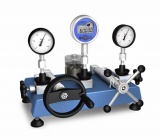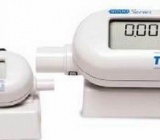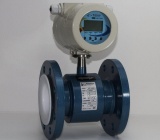Bench weight scale verification

Main contents
- What are bench weight scales?
- Structure and operating principle
- Application
- Why should you verify a bench weight scale?
- Verification procedure - Bench weight scale
A bench scale is a common type of electronic scale that usually has a maximum weight capacity of 30kg, has a flexible maximum size of about 35x35cm, can be conveniently portable and moved with many uses such as quantitative weighing, Sample counting scales, packaging scales at home, stores, supermarkets, offices, companies, factories, post offices...
1. What are bench weight scales?
Bench Weight Scales have a resolution of <1/1,000 and a maximum weight of 60kg, usually weighing in g. Currently, disc scales are also called common scales because they are very popular in the market. A disc scale is a medium-accuracy non-automatic scale according to OIML R76-2006, including electronic scales, digital indicators, mechanical disc scales, etc.

2. Structure and operating principle
2.1 Structure
The bench weight scale is composed of the following basic components:
- Digital display or indicator: to display the weight value and process the main functions of the scale such as counting, analyzing, percentage weighing, and tare weighing.
- Load cell: a force sensor that converts the weight of an object on the scale into an electrical signal.
- Weighing pan or scale plate: a component used to place the object on the scale, usually made of stainless steel or plastic.
Microprocessor: used to convert signals from the load cell, which can be either an analog or digital signal
2.2 Operating principle
- The operating principle of an electronic scale is elementary: When you place an object on the scale, the scale will transmit a signal to the microprocessor on the scale head, and the scale head will process the signal and display the corresponding weight...
- The better the quality of the force sensor and electronic scale head, the more stable and accurate the scale will be.
- Each type of scale is designed for different applications, depending on the maximum scale weight, the allowable error will correspond. The larger the maximum weight, the larger the error.
3. Application
- In Industry: Bench scales are used to check the accuracy of manufactured products. Bench scales are used to balance weight during the production process so that the production process is carried out correctly and results in the highest quality products. For example in:
- Textile industry: used to balance weight in the clothing production process, helping to ensure that the amount of material used is reasonable, while also helping to optimize the production process.
- Food industry: Used to measure ingredients in the food production process such as sugar, salt, flour, etc. Helps production recipes be carried out accurately and meet quality requirements of product.
- In agriculture:
- Used to balance weight when carrying goods: Bench scales are used to help farmers balance weight when transferring agricultural products from one place to another. Agricultural products such as vegetables, fruits, livestock, and poultry all need to be measured and checked for weight accuracy to ensure that they are delivered safely and reliably.
- Used to check the accuracy of the measurement process: Bench scales are used to accurately measure the weight of these products to ensure compliance with food safety standards and meet food needs. market demand.
- Use in preserving agricultural products: To ensure that agricultural products are preserved and transferred in the most perfect condition, bench scales are used to measure the weight of agricultural products such as rice, wheat, beans, pepper, ... before packaging and preserving. Ensure product quality and value are not lost after packaging and transportation.
- In Health: Weighing health, weighing luggage for passengers when traveling by plane, weighing newborn babies
4. Why should you verify bench scales?
- Electronic scales need to be calibrated before being put into use because if not calibrated, there will be errors. Electronic scales when imported from abroad need to be tested to make the scales more accurate when put into use, to avoid causing damage to users.
- Scale inspection will increase credibility when used because the scale is inspected by competent agencies that grant inspection licenses.
5. Verification procedure
- Measurement standards:
- The weight has a total mass equal to the Max, with an accuracy class of M1
- The weight determines the error, (1 ÷ 500) g; (1 ÷ 10) kg, with an accuracy class of M1
- Other means: Load tare enough to check up to Max
- Temperature: as the normal working temperature of the scale.
- External influences (vibration, magnetic field, grid voltage, …) do not affect the test results.
- The scale must be completely assembled, clean, placed on a flat surface, and ready for verification.
- Gather enough standard weights, tares and other testing means. The standard weights must still be valid for verification.
.
- Check the label
- Position of verification stamp and label
- Check the completeness of the scale's parts
- Check the surface of the scale details
5.4.2 Technical inspection
- Interface between the scale and peripheral devices
- Check the unit and total parts
- Check the maximum permissible error (MPE)
- Check sensitivity
- Check dynamic range
- Check repeatability
- Check result deviation
- Check the eccentric load
- Check the accuracy at each scale level
If a bench weight scale meets the requirements of this procedure, it will be issued a verification certificate and verification seal and/or a verification sticker as required. The verification seal must be affixed (or the verfication sticker must be affixed) at locations that prevent the adjustment of the accuracy of the scale.
If a bench weight scale does not meet one of the requirements of this procedure, it will not be issued an verification sticker, and the old verification seal (if any) will be removed.
The verification cycle of a bench weight scale is 24 months.
To consult and request a quote on our verification services, please kindly contact us via the following information:
LABORATORY: DONG TAM MEASUREMENT AND TECHNICAL TRADING SERVICE CO., LTD
Address: No.57-59 Street 11, Binh Hung Residential Area, Binh Hung Commune, Binh Chanh District, Ho Chi Minh City
TEL: 028 375 83 869 - Hotline: 0909 347 891 (Mr. Lâm)
Email: info@dongtam-mes.vn
Relative post | Xem tất cả
- Stopwatches calibration
- ORP meter calibration
- Hydrometer calibration
- Analytical and Technical balance calibration
- Analytical and Technical balance verification
- Spring dial scales verification
- Spring dial scales calibration
- Bench weight scales calibration
- Platform scales verification
- Platform scales calibration
- Chlorine meter calibration
- Total suspended solids (TSS) meter calibration























 Legal
Legal  Call: 0283.7583869
Call: 0283.7583869  Search for Certificate
Search for Certificate  Contact
Contact